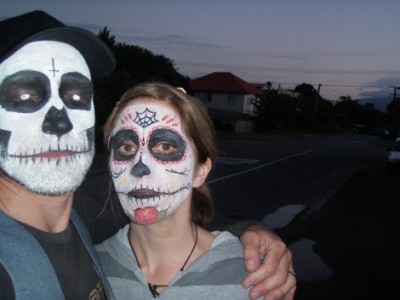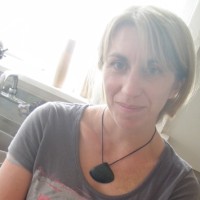That’s some terrific Day of the Dead makeup in your photo.
Thanks! We were going to a Halloween party. I was going as a zombie cheerleader, but my husband painted my face like this. At the party I got talking to a lovely lady pirate who was sporting a black bandanna and curly moustache. She turned out to be from Mexico City, which led to an awkward moment as I considered the fact I was ignorantly appropriating her culture.
You mention in your bio that you are an echocardiographer. Which came first for you, the interest in the sciences or the interest in creative writing?
The two feel intertwined really. Part of science is questioning, exploring, and communicating, and creative writing is too, just in a different format. Historically there hasn’t been a big divide either. In seventeenth century England poetry students attended anatomy lectures.
Retrospectively I think whatever job I’ve had it’s been the narrative aspects that I’ve enjoyed the most. I was an SPCA inspector for a couple of years. It was all about investigating complaints of animal cruelty, which we would characterize into ‘skinny dog’, ‘dog on chain’ etc., but there was always a story behind their predicament that revolved around their owner. It didn’t excuse what happened with the animal, but I just found it interesting. Today I scan hearts, but alongside the echo findings it’s learning the person’s history and symptoms and then following the progression of their heart condition and treatment that is fascinating and endlessly variable.
I laughed at “Go boil your heads! The whole lot of you!” Does the narrator in “The Borders” invoke that Scottishism to tell off her coworkers, or might she have heard that growing up in New Zealand?
I think the saying is known in both cultures. I used it because I was imagining the coworkers as having heads resembling the potatoes from their factory, which would be boilable, which is sort of silly insulting – though as a teen I lived in a town where to be called a ‘clown’ or an ‘egg’ was infinitely more demeaning than being called a bastard or a fuckwit. But I was also thinking about how heads are tapu to Maori, which makes the insult potentially very offensive. So yeah, I was trying to use something that could be taken either way depending on your cultural lens. It seemed to fit with this narrator’s identity struggle.
Have you traveled extensively overseas? Did you ever work at a job like the tattie factory in real life?
For most Kiwis some sort of ‘overseas experience’ is considered a rite of passage. Mine was pretty minor, but I did work at a potato factory in the Borders of Scotland for a few months. It was great. Those people still live large in my imagination.
I’ve read several of your works, such as the award-winning “Ginger Beer” (2011 Commonwealth Short Story competition regional winner for the Pacific) and “The Cross” (shortlisted for the 2012 Manhire Prize for fiction). You seem to have a variety of arrows in your quiver. Do you find you have favorite genres or lengths for your work?
Thanks for reading them. I fell pregnant in 2007 when I was doing an MA. I wrote a novel draft that year but since then all the work has been short, matching the sporadic and small bursts of time I have to write. I’d love to write something longer.
Your style is so nicely cinematic—I feel I am there with the characters in that room, on that bike, in that tearoom. And now you’ve had your work recorded by a professional voice actor. Could you picture any of your stories ever becoming a short film? If so, which one(s)?
It was a real thrill to hear Penny Downie read that story so beautifully.
I don’t think I’ve got the knowledge about what would translate well to film. When I was doing the MA I remember Damien Wilkins talking about the writing he’d done for television, and it sounded like a completely different process than writing for the page – we don’t have to worry about insuring our characters for the things we put them through. But I’d be hugely excited to see any of my stories on screen, however anybody chose to interpret them.
This entire issue is themed Aotearoa/New Zealand. What, in your opinion, makes New Zealand writers and writing unique, or different?
Well, I don’t know if it is unique or different, but New Zealand writers are a great bunch of people. It’s a conscious decision to write for most, because it’s generally not the thing that is paying the bills, and so everyone is passionate and committed, generous and encouraging – at least that’s been my experience.
As for the writing itself – hard to tell when you’re in the trenches I think. But from my perspective it is as exciting and diverse as anywhere else in the world, maybe even more so – but I would say that.
What do you enjoy doing when not at work, and when not writing/revising/submitting?
Watching my two preschoolers dance around the living room is always guaranteed to make me smile.



